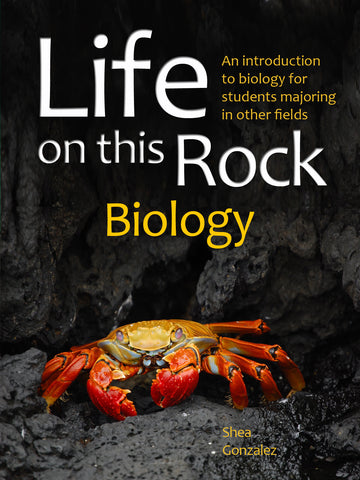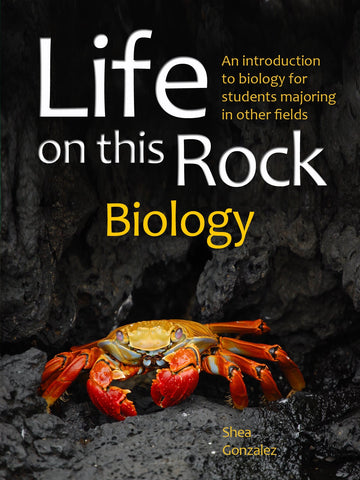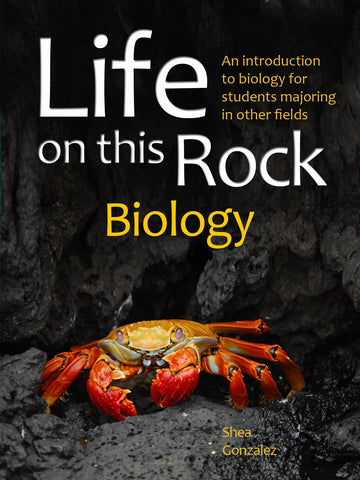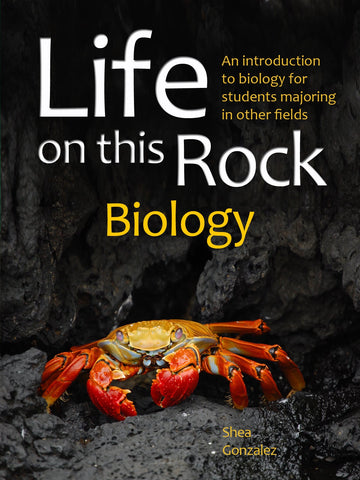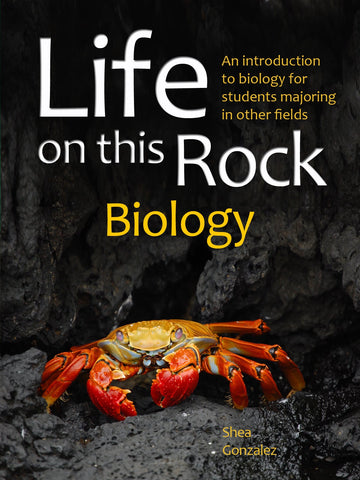
Umass Lowell - Life Science I - LIFE 1010 - 101 - TR - Shea - Spring 2025
Taught by Professor Shea
IMPORTANT: Please use your student email address (if you have one) when completing the checkout process.
Overview
The subtitle of Life on this Rock, “An Introduction to Biology for Students Majoring in Other Fields,” says it all. Life on this Rock is not “Biology-Lite,” in which the subject matter is merely diluted.
Life on this Rock begins by explaining how the “Scientific Method” is not just an academic exercise confined to a laboratory, but rather a universal approach that can be applied to various aspects of life, such as critiquing a business plan, analyzing a contract, or validating the “facts” being shouted through a microphone. The introductory chapter continues by removing the mystery of how science is conducted and reported.
Each chapter builds upon the previous one, guiding the reader from a simple, yet complete, investigation of the molecules that form us, how we and other organisms live and reproduce, and ultimately how we and all other organisms are dependent upon each other and the Earth itself.
Life on this Rock allows students, regardless of their prior exposure to science, to gain a critical understanding of aspects that affect their lives now and will continue to do so in the future, including…
- How will Climate Change affect us?
- How might an inherited disease affect one’s family?
- How will Stem Cells provide future therapies?
- How reliable is DNA as evidence?
- Is Evolution real, and is it still occurring?
- How will we cope with overpopulation?
- How has our techno-machine threatened our own existence?
- Are Genetically-Modified Foods dangerous?
Regardless of one’s field of study or line of work, everyone needs a basic understanding of these issues that they can apply to everyday life. This understanding is rooted in Biology, the study of life.
Along the way, Life on this Rock shows how scientists who made major key discoveries achieved success by “thinking outside the box” and bringing together knowledge from fields other than science, highlighting the importance of a broad base in one’s education. Life on this Rock was crafted from the author’s >20 years of teaching Biology to university students of all majors and all levels, with the recognition that they are the scholars, and the voters, of our future.
- Self-assessment questions, with accessible answers, included in each chapter help the reader focus on key points.
- Ability to highlight and annotate the text
- Online glossary integrated into text
- Over 250 illustrations
- Highlights of “real-world” applications of key principles
- Complete with 700 Power Point slides, featuring all text figures with notes, as a downloadable supplement. These slides also serve as an outline for study, and allow students to follow along during lectures and annotate the slides, rather than attempt to copy what is being shown on screen during lectures.
Table of Contents
Chapter 1: Thinking Like a Scientist
Chapter 2: Living Things are made of Cells, and Cells are made of Molecules
Chapter 3: Living Things Survive by Gathering, Storing and Using Energy
Chapter 4: The Genetic Code: Instructions to Build Living Things
Chapter 5: Life has Evolved and Continues to Evolve
Chapter 6: Living Things and the World
Additional Resources
Instructor Resources
About the Author
About the Author
Dr. Thomas Shea
Dr. Shea has published over 300 scientific articles, trained 16 doctoral students, 30 Master’s degree recipients, and supervised over 35 undergraduate research projects. While he’s enjoyed teaching at all levels for 20 years, he particularly likes teaching Life Science to students majoring in other fields, where he has “the opportunity to present important aspects of science to the voters of the future.”
Dr. Shea holds his Ph.D. degree in Biology from Northeastern University, and earned his M.S. and B.A. degrees in Biology at the University of Massachusetts. He has obtained over 5 million dollars in funding for his research, from sources including the National Science Foundation, the National Institutes of Health, the Army Research Labs, the Alzheimer’s Association, the ALS Association, and the American Federation for Aging Research.
Dr. Shea and his team have demonstrated that certain combinations of vitamins and nutritional supplements not only delay the progression of Alzheimer’s disease, but if started early enough, can actually improve memory and mood in individuals with Alzheimer’s disease as well at adults without dementia. He frequently presents a wide range of seminars and workshops on the benefit of nutrition for age-related loss of memory. When not at work, Dr. Shea studies karate, where he holds a 6th degree black belt, and tends to his Japanese Garden.
Kimberly A. Gonzalez
Kimberly Gonzalez is currently an assistant professor at Middlesex Community College, where she teaches General Biology and Microbiology courses to life science and health science majors. Prior to her community college appointment, Ms. Gonzalez taught high school biology, microbiology, and general biology, at various levels, for 12 years at Lowell High School. Before becoming a teacher, Ms. Gonzalez worked as a clinical microbiologist at Tufts Medical Center in Boston, MA. She holds a B.S. in biology, and an M.Ed. in education, both from the University of Massachusetts Lowell. She will complete an M.S. in biology from the University of Nebraska Kearney in the Spring of 2017. Her teaching passion centers around the area of microbiology and student-led inquiry explorations. At her previous school, Ms. Gonzalez mentored approximately 20 high school students in conducting microbiology experiments of their choosing; an endeavor she hopes to continue at Middlesex Community College. Her student's work has been published in the Journal of Emerging Investigators.
We Also Recommend

